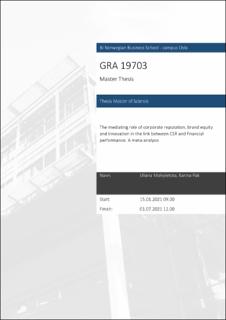| dc.description.abstract | Over the last 50 years, corporate social responsibility (CSR) programs have become
more prominent in the business world. Corporations started investing in such
programs to strengthen its’ brand and satisfy evolving customer needs.
Additionally, it is believed that a CSR-oriented strategy not only creates a good
corporate image but also brings value to a company in the form of financial benefits.
Through meta-analytical structural equation modelling, we aggregated results from
58 studies consisting of 291 correlation coefficients to examine the robustness of
the CSR-CFP relationship. Our study examines three different mechanisms
explaining how CSR positively affects the firm's short- and long-term financial
performance. We fill the gap in the existing literature by exploring the roles of
corporate reputation, brand equity and innovation as they pertain to the link between
CSR practices and financial performance. The findings of our research revealed that
CSR affects positively accounting-based FP ( profitability, sales, ROA, ROI, ROS,
etc.) through enhanced corporate reputation and brand equity. Moreover, we found
that CSR stimulates innovation and improves the reputation of a firm contributing
to increased stock returns. However, CSR does not directly lead to higher stock
performance. We conclude with a theoretical contribution, managerial implications,
limitations and guidance for future research. | en_US |
